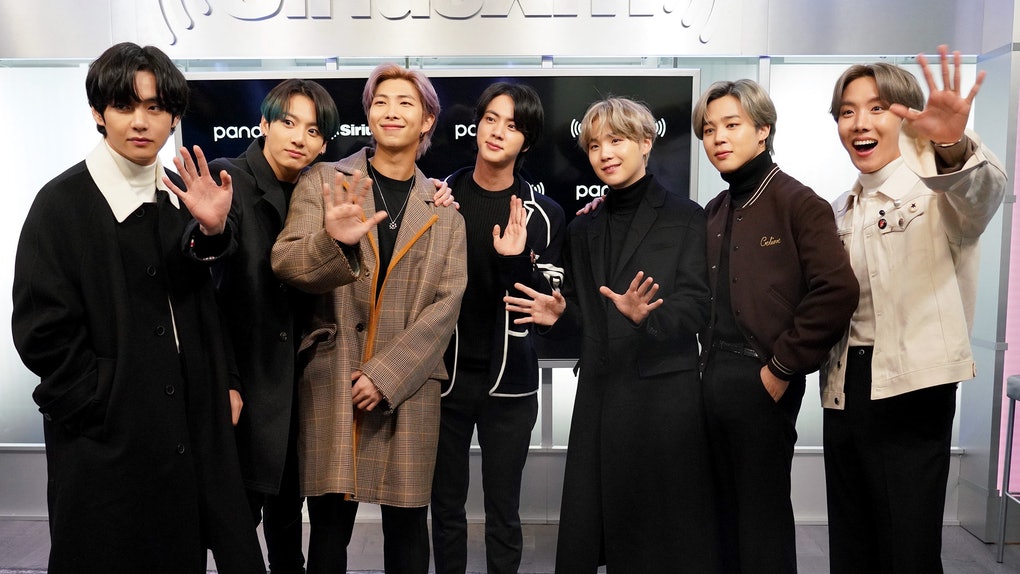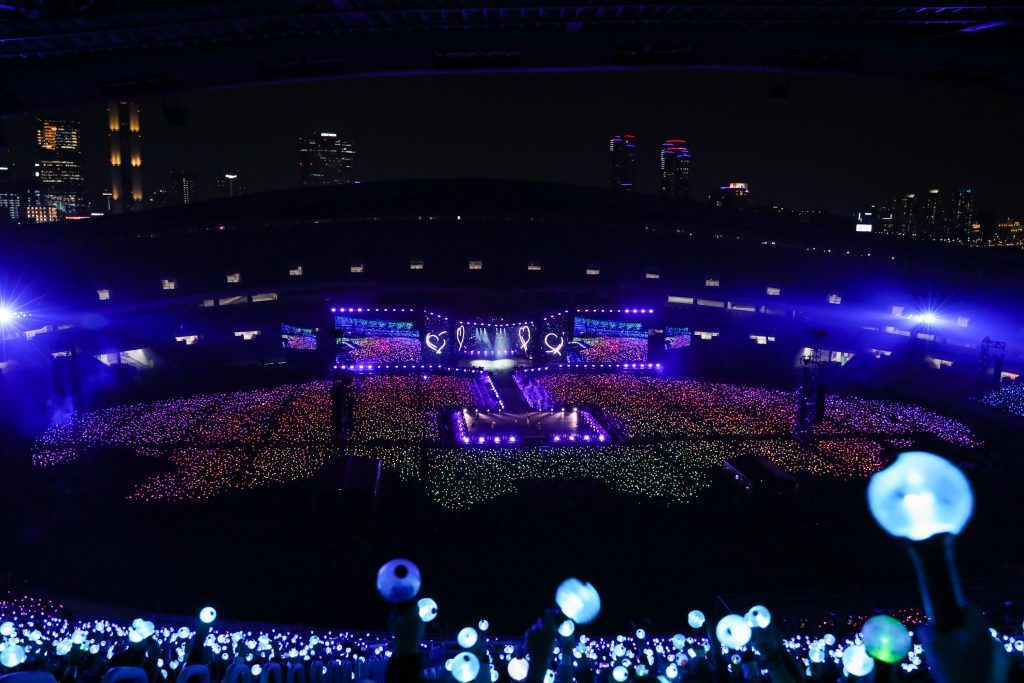Even if you’re not a fan of the band or K-Pop or the music scene in general, you’ve surely heard of BTS.

Composed of seven talented members, BTS is a global phenomenon that has amassed millions of fans due to their performances in music and dance. Led by RM (Kim Namjoon), Suga, J-Hope, Jimin, V and Jungkook spread happiness, awareness and love with their music, as well as encourage laughs with their antics. Thanks to their fame, BTS’ net worth and their following continue to grow (both IRL and on BTS Twitter).
Everyone knows they’re called BTS, but many still ask “What does BTS stand for? What does their name even mean?”
The Story Behind The Name: What Does BTS Stand For?
Before the band’s fame, most people associated BTS with the phrases “behind the scenes,” “be there soon” or even “better than sex.” Since BTS’ rise to fame, the meaning has changed.
BTS (Korean: 방탄소년단) stands for Bangtan Sonyeondan, which means “Bulletproof Boy Scouts.” Specifically, the word “Bangtan” means “to be resistant to the bullets.”
According to J-Hope, aka the member in charge of explaining their name, BTS has a profound meaning for the band. In an interview with Affinity Magazine, J-Hope explained that being bulletproof in BTS terms meant blocking out criticisms, expectations and stereotypes that hit today’s youth like bullets. The name BTS is a symbol of the band’s goal to preserve the ideals and values of the younger generation.
In 2017, BTS and their company, Big Hit Entertainment, announced the extension of the band’s identity and branding. Apart from redesigning its logo, BTS added meaning to what it stands for. The letters B-T-S now also stand for Beyond the Scene. The new name represents the new generation of youth who do not settle for their current situation. As for what the new BTS logo means, the two trapezoids symbolize doors, which complemented the new symbol for the fandom (ARMY). The logo conveys BTS and ARMY becoming one together.
BTS’ original and extended meaning both support the resilience of the youth, as well as represent their encouragement of speaking your voice — a truth lived out in their songs and advocacy.
What BTS Stands For: The Advocacy of the Name in Three Parts
The meanings behind BTS’ name are more than just decorations. BTS lives out their name through the messages of their songs and the causes they fight for. They give their fans and listeners an avenue to voice out their opinions on today’s pressing issues.
Part 1: I Need U
The struggles of today’s youth were one of the primary subjects behind their “The Most Beautiful Moment in Life” (Hangul: 화양연화; Hwa Yong Yeon Hwa. Abbreviated to HYYH) era. The era, which began in April 2015 and ended in May 2016, dissects the reality of youth being a turbulent yet beautiful moment in one’s life.
According to leader Kim Namjoon, many young people are suffering due to the demands of life since they are not as privileged as the richer youth. But even in the transition period, many young people believe happiness is impossible to achieve. BTS detracts this belief by acknowledging the struggles of the youth through songs that promote finding happiness while achieving something.
“I Need U” may be the song that garnered BTS their first music show win but it’s more than that. It’s one of the few songs that openly expressed the reality of loneliness and depression in today’s youth. The original music video shows scenes of the band going through loneliness, broken families and attempted suicide. In the MV, fans see the group living the most beautiful moments of their lives and living through hell at the same time. Teenagers who struggled to survive or battled with mental health concerns were encouraged to see idols portraying the same struggles. BTS not taking difficult times for granted made the younger generation felt understood.
Part 2: Silver Spoon
Another song from the era called “Silver Spoon (Crow-Tit; Baepsae)” highlighted the inequality of society in terms of privilege and hard work. Baepsae is a type of bird called “crow-tit.” A Korean idiom refers to the “baepsae” attempting to walk like a stork but ends up breaking its legs because they are shorter than a stork’s. The idiom is used for someone who tries too hard to achieve something.
In South Korea, the younger generation is told to work harder, so they won’t suffer in the future. In the case of BTS, they were told the same thing but without the privilege other bands their generation had — especially those that debuted under the Big 3: YG, SM and JYP. According to the band, artists who came before them controlled charts and sales by making a standard that puts the younger generation of artists at a disadvantage and that wasn’t fair. Those who had money enjoyed their beauty sleep while those who weren’t as rich continued to struggle without the guarantee of success.
This is what BTS called out in the conservative South Korean society: the unfairness of an older generation that claims only hard work will get them success. In an unfortunate reality, privilege works to the advantage of those who are blessed. Those who do not have the riches must work harder.
Part 3: Answer: Love Myself
Finally, BTS addresses the reality of mental health among the youth. The list of the band’s songs dedicated to depression, anxiety and other mental health concerns is an extensive one. From BTS Suga’s “The Last” and his entire “AGUST D” mixtape to their songs “Whalien 52,” “Tomorrow” and more, BTS does not shy from the topic.
Each member’s journey on mental health finds a close, if not a pique, in their song “Answer: Love Myself,” which was released during their Love Yourself campaign. The entire campaign was dedicated to helping the youth appreciate both their strengths and weaknesses. It was also a joint venture with UNICEF, as both the organization and BTS campaigned against violence towards teens and children, with the hope of making the world a better place through music.
The song “Answer: Love Myself” is the closing song for the band’s repackaged album “Love Yourself: 結 ‘Answer.’” The lyrics resolve the struggles of self-love, which BTS explained in previous songs. The song expresses the importance of wholeheartedly accepting and loving yourself — a common struggle for today’s youth. The band expresses their gratitude to their fans for helping them love themselves and wishes to be a beacon of hope for fans in return.
But What Does ARMY Stand For?

Speaking of the fans, BTS shares a strong connection with their fandom. If the name BTS has a meaning, so does the fandom, ARMY.
In July 9, 2013, BTS officially named their fans A.R.M.Y, which stands for Adorable Representative MC for Youth. Apart from the abbreviation, the word ‘army’ is associated with military and body armor, which are two things that always go together. The fandom name means that fans will always be with BTS and vice versa.
The 2017 re-branding involved a change in ARMY’s logo, which were two trapezoids facing outward. This symbolized ARMY as the opening of the door, the person who is on the other side welcoming BTS when the band opens a new door.
In real life, ARMY is always waiting for the band, eager to support the new cause. Whenever BTS opens a door, ARMY will always be there for them.
BTS Stands for Inspiring Others
Despite being famed entertainers, BTS also make waves as active philanthropists. Their global success has not gotten to the band’s heads, which makes them more interesting and appealing to fans (and potential fans). From championing social causes to donating to charity, each member of BTS has taken it upon himself to make the world a better place. And they’ve inspired ARMY to do the same thing too.
Here are several ways the band has inspired to create a lasting change in the global fight to defeat poverty, feed the hungry and protect the planet.
Supporting Others’ Rights to Learn
In 2019, J-Hope donated almost $85,000 USD to provide scholarships for low-income students at the Jeonnam Girls’ Commercial High School in South Korea. But he’s not the only member who supports everyone’s right to learn.
Busan native Jimin attended Busan High School of the Arts to pursue his passion for dancing. Since 2016, he has given back to the educational community by making several donations to support Busan education, donating resources and money to help students in need of financial assistance.
Standing Up Against Racial Injustice
In the wake of global protests against racism in June 2020, BTS made its stand. Apart from speaking up about the harms of racial injustice, the band donated $1 million to the Black Lives Matter movement to support anti-racism initiatives. Speaking about the donation to Variety, Jin said the band has been subjected to racial prejudice. He insists that prejudice “has no place” in the world and must not be tolerated.
Within a day after BTS’s donation, ARMY joined together to match the band’s donation by giving another million to the Black Lives Matter organization.
#StopAsianHate#StopAAPIHate pic.twitter.com/mOmttkOpOt
— 방탄소년단 (@BTS_twt) March 30, 2021
Earlier this year, BTS posted a tweet concerning anti-Asian hate, which arose due to the pandemic and xenophobic actions and remarks targeting Asian communities. In the tweet, the group shared how they were affected by racism and called for an end to spreading hate.
Caring for the Environment
BTS also cares about Mother Earth. In 2019, the ABB FIA Formula E Championship named the band as their global ambassadors. The organization’s street racing series uses electric cars that promote a better future via clean energy.
BTS’s pursuit for better earth has inspired its fans to do the same. From planting more than 8,000 trees to providing relief from wildfires, BTS has inspired ARMY to take action against climate change.
In technical terms, BTS stands for Bulletproof Boyscouts known for their songs, amazing stage performances and authentic fashion. In reality, their name stands for many things. They stand for the youth, for the oppressed and those struggling with life. They stand for the fans that stand behind them till the end of time.

